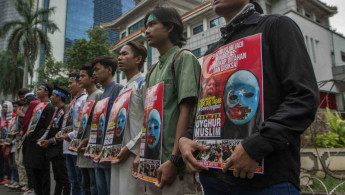Turkey slams China over Uighur abuses, as Saudi crown prince defends 'reeducation camps'
Last week while visiting China, Saudi Crown Prince Mohammed bin Salman said he supports China's "right" to undertake "anti-terrorism" and "de-extremism" measures.
His comments were interpreted as approval for Beijing's mass detention of Uighur men and drew huge criticism from activists.
The Uighur community had expected Prince Mohammed, de facto ruler of Saudi Arabia and custodian of Islam's holiest sites, to raise the issue of China's human rights violations against its Muslim minority.
Unlike Saudi Arabia and most Muslim nations, however, Turkey recently issued a rare rebuke of the Chinese regime, and on Monday, Ankara reiterated its position before the UN Human Rights Council.
Addressing the council, Turkish Foreign Minister Mevlut Cavusoglu said Turkey recognised "China's right to combat terrorism," but urged the country to respect freedom of religion and to safeguard Uighurs' and other Muslims' cultural identities.
|
Turkey, which shares cultural and religious ties with the Uighurs, has been the only majority Muslim country to criticise Beijing over a wide-ranging crackdown of religion and minority languages. The Turkish foreign ministry called China's treatment of Uighurs "a great cause of shame for humanity".
Cavusoglu in his speech also criticised Israel, saying human rights violations against Palestinians have "reached an alarming level".
Many Uighurs say more than half of their family members are detained either in prison or in "re-education" concentration camps, according to HRW.
The repression of Uighurs in the far-northwestern province Xinjiang is not confined to imprisonment and alleged torture.
Xinjiang has over the past years become a testing ground for high-tech surveillance technology. Authorities have collected masses of biometric data from Chinese Muslims in the province and heavily restricted residents' freedoms of movement and activity.
Chinese authorities justify these actions as necessary measures to stamp out separatist "terrorist" groups in the region.
Read also: Explainer: China's persecution of Uighur Muslims
(With input from agencies)





 Follow the Middle East's top stories in English at The New Arab on Google News
Follow the Middle East's top stories in English at The New Arab on Google News
![Israeli forces ordered bombed Gaza's Jabalia, ordering residents to leave [Getty]](/sites/default/files/styles/image_330x185/public/2176418030.jpeg?h=a5f2f23a&itok=_YGZaP1z)

